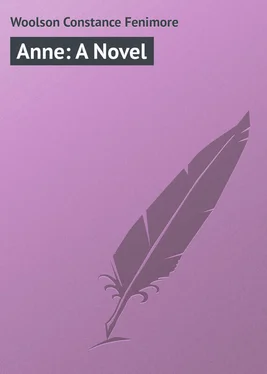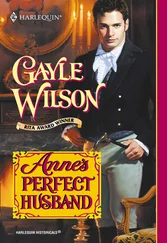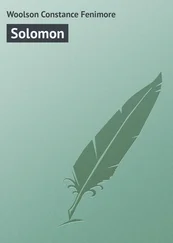Constance Woolson - Anne - A Novel
Здесь есть возможность читать онлайн «Constance Woolson - Anne - A Novel» — ознакомительный отрывок электронной книги совершенно бесплатно, а после прочтения отрывка купить полную версию. В некоторых случаях можно слушать аудио, скачать через торрент в формате fb2 и присутствует краткое содержание. Жанр: Классический детектив, foreign_detective, foreign_prose, на английском языке. Описание произведения, (предисловие) а так же отзывы посетителей доступны на портале библиотеки ЛибКат.
- Название:Anne: A Novel
- Автор:
- Жанр:
- Год:неизвестен
- ISBN:нет данных
- Рейтинг книги:5 / 5. Голосов: 1
-
Избранное:Добавить в избранное
- Отзывы:
-
Ваша оценка:
- 100
- 1
- 2
- 3
- 4
- 5
Anne: A Novel: краткое содержание, описание и аннотация
Предлагаем к чтению аннотацию, описание, краткое содержание или предисловие (зависит от того, что написал сам автор книги «Anne: A Novel»). Если вы не нашли необходимую информацию о книге — напишите в комментариях, мы постараемся отыскать её.
Anne: A Novel — читать онлайн ознакомительный отрывок
Ниже представлен текст книги, разбитый по страницам. Система сохранения места последней прочитанной страницы, позволяет с удобством читать онлайн бесплатно книгу «Anne: A Novel», без необходимости каждый раз заново искать на чём Вы остановились. Поставьте закладку, и сможете в любой момент перейти на страницу, на которой закончили чтение.
Интервал:
Закладка:
Woolson Constance Fenimore
Anne: A Novel
CHAPTER I
"Heaven lies about us in our infancy!
Shades of the prison-house begin to close
Upon the growing boy;
But he beholds the light, and whence it flows,
He sees it in his joy.
The youth who daily farther from the East
Must travel, still is Nature's priest,
And by the vision splendid
Is on his way attended;
At length the man perceives it die away,
And fade into the light of common day."
"It is but little we can do for each other. We accompany the youth with sympathy and manifold old sayings of the wise to the gate of the arena, but it is certain that not by strength of ours, or by the old sayings, but only on strength of his own, unknown to us or to any, he must stand or fall." – Emerson.
"Does it look well, father?"
"What, child?"
"Does this look well?"
William Douglas stopped playing for a moment, and turned his head toward the speaker, who, standing on a ladder, bent herself to one side, in order that he might see the wreath of evergreen, studded with cones, which she had hung on the wall over one of the small arched windows.
"It is too compact, Anne, too heavy. There should be sprays falling from it here and there, like a real vine. The greenery, dear, should be either growing naturally upward or twining; large branches standing in the corners like trees, or climbing vines. Stars, stiff circles, and set shapes should be avoided. That wreath looks as though it had been planed by a carpenter."
"Miss Lois made it."
"Ah," said William Douglas, something which made you think of a smile, although no smile was there, passing over his face, "it looks like her work; it will last a long time. And there will be no need to remove it for Ash-Wednesday, Anne; there is nothing joyous about it."
"I did not notice that it was ugly," said the girl, trying in her bent posture to look at the wreath, and bringing one eye and a portion of anxious forehead to bear upon it.
"That is because Miss Lois made it," replied William Douglas, returning to his music.
Anne, standing straight again, surveyed the garland in silence. Then she changed its position once or twice, studying the effect. Her figure, poised on the round of the ladder, high in the air, was, although unsupported, firm. With her arms raised above her head in a position which few women could have endured for more than a moment, she appeared as unconcerned, and strong, and sure of her footing, as though she had been standing on the floor. There was vigor about her and elasticity, combined unexpectedly with the soft curves and dimples of a child. Viewed from the floor, this was a young Diana, or a Greek maiden, as we imagine Greek maidens to have been. The rounded arms, visible through the close sleeves of the dark woollen dress, the finely moulded wrists below the heavy wreath, the lithe, natural waist, all belonged to a young goddess. But when Anne Douglas came down from her height, and turned toward you, the idea vanished. Here was no goddess, no Greek; only an American girl, with a skin like a peach. Anne Douglas's eyes were violet-blue, wide open, and frank. She had not yet learned that there was any reason why she should not look at everything with the calm directness of childhood. Equally like a child was the unconsciousness of her mouth, but the full lips were exquisitely curved. Her brown hair was braided in a heavy knot at the back of her head; but little rings and roughened curly ends stood up round her forehead and on her temples, as though defying restraint. This unwritten face, with its direct gaze, so far neutralized the effect of the Diana-like form that the girl missed beauty on both sides. The usual ideal of pretty, slender, unformed maidenhood was not realized, and yet Anne Douglas's face was more like what is called a baby face than that of any other girl on the island. The adjective generally applied to her was "big." This big, soft-cheeked girl now stood irresolutely looking at the condemned wreath.
The sun was setting, and poured a flood of clear yellow light through the little west windows; the man at the organ was playing a sober, steadfast German choral, without exultation, yet full of a resolute purpose which defied even death and the grave. Out through the eastern windows stretched the frozen straits, the snow-covered islands, and below rang out the bugle. "It will be dark in a few moments," said Anne to herself; "I will do it."
She moved the ladder across to the chancel, mounted to its top again, and placed the wreath directly over the altar, connecting it deftly with the numerous long lines of delicate wreathing woven in thread-like green lace-work which hung there, waiting for their key-stone – a place of honor which the condemned wreath was to fill. It now crowned the whole. The little house of God was but an upper chamber, roughly finished and barren; its only treasure was a small organ, a gift from a father whose daughter, a stranger from the South, had died upon the island, requesting that her memorial might be music rather than a cold stone. William Douglas had superintended the unpacking and placing of this gift, and loved it almost as though it had been his own child. Indeed, it was a child, a musical child – one who comprehended his varying moods when no one else did, not even Anne.
"It makes no difference now," said Anne, aloud, carrying the ladder toward the door; "it is done and ended. Here is the ladder, Jones, and please keep up the fires all night, unless you wish to see us frozen stiff to-morrow."
A man in common soldier's uniform touched his cap and took the ladder. Anne went back. "Now for one final look, father," she said, "and then we must go home; the children will be waiting."
William Douglas played a few more soft strains, and turned round. "Well, child," he said, stroking his thin gray beard with an irresolute motion habitual with him, and looking at the small perspective of the chapel with critical gaze, "so you have put Miss Lois's wreath up there?"
"Yes; it is the only thing she had time to make, and she took so much pains with it I could not bear to have her disappointed. It will not be much noticed."
"Yes, it will."
"I am sorry, then; but it can not be moved. And to tell the truth, father, although I suppose you will laugh at me, I think it looks well."
"It looks better than anything else in the room, and crowns the whole," said Douglas, rising and standing by his daughter's side. "It was a stroke of genius to place it there, Anne."
"Was it?" said the girl, her face flushing with pleasure. "But I was thinking only of Miss Lois."
"I am afraid you were," said Douglas, with his shadowy smile.
The rough walls and beams of the chapel were decorated with fine spray-like lines of evergreen, all pointing toward the chancel; there was not a solid spot upon which the eye could rest, no upright branches in the corners, no massed bunches over the windows, no stars of Bethlehem, anchors, or nondescript Greek letters; the whole chapel was simply outlined in light feathery lines of green, which reached the chancel, entered it, played about its walls, and finally came together under the one massive wreath whose even circle and thick foliage held them all firmly in place, and ended their wanderings in a restful quiet strength. While the two stood gazing, the lemon-colored light faded, and almost immediately it was night; the red glow shining out under the doors of the large stoves alone illuminated the room, which grew into a shadowy place, the aromatic fragrance of the evergreens filling the warm air pungently, more perceptible, as fragrance always is, in the darkness. William Douglas turned to the organ again, and began playing the music of an old vigil.
Читать дальшеИнтервал:
Закладка:
Похожие книги на «Anne: A Novel»
Представляем Вашему вниманию похожие книги на «Anne: A Novel» списком для выбора. Мы отобрали схожую по названию и смыслу литературу в надежде предоставить читателям больше вариантов отыскать новые, интересные, ещё непрочитанные произведения.
Обсуждение, отзывы о книге «Anne: A Novel» и просто собственные мнения читателей. Оставьте ваши комментарии, напишите, что Вы думаете о произведении, его смысле или главных героях. Укажите что конкретно понравилось, а что нет, и почему Вы так считаете.












